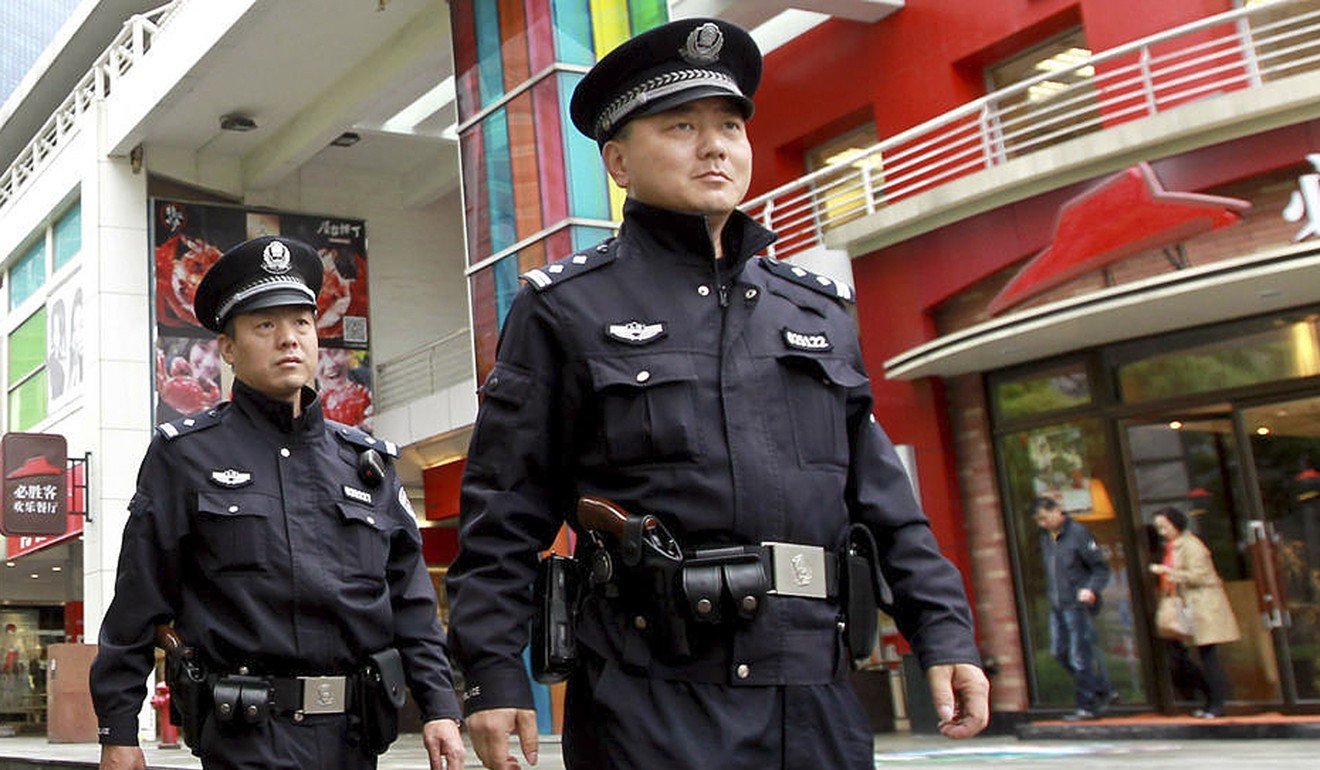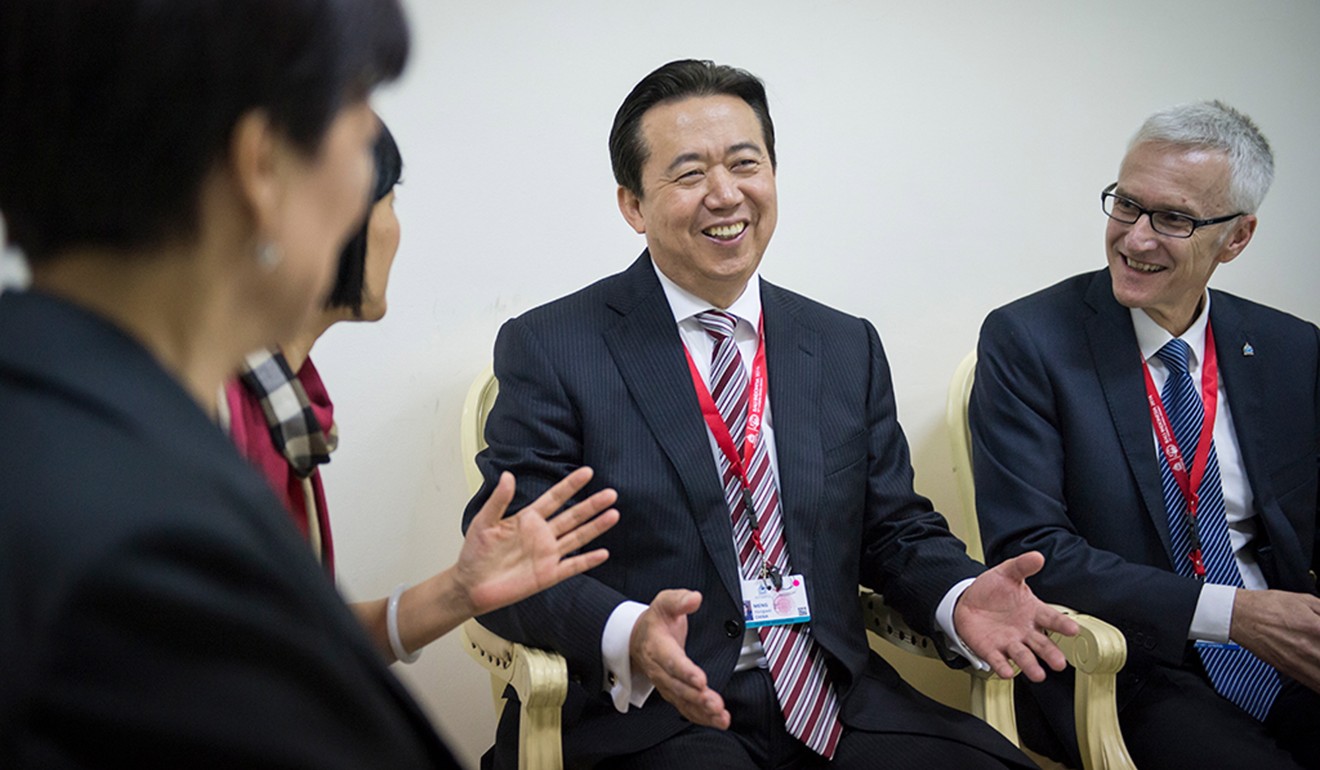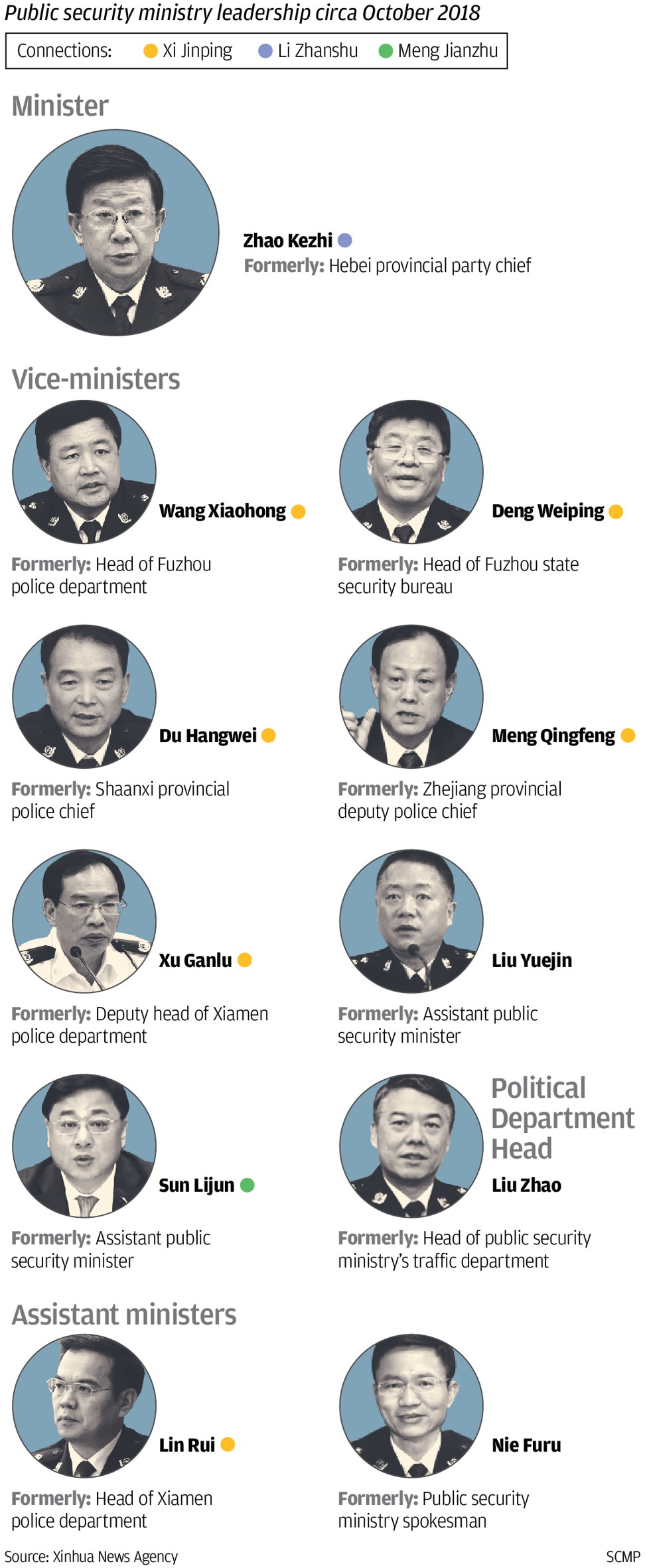
China’s removal of Meng Hongwei completes reshaping of public security ministry
The ex-president of Interpol was the final member of a powerful team in place when Xi Jinping took office in 2013
The downfall of the former head of Interpol, Meng Hongwei, effectively completed a gradual change of guard in the top echelon of the 2 million strong police force Chinese President Xi Jinping inherited five years ago.
Analysts said the line-up of the minister and his deputies at the Ministry of Public Security, where Meng was a senior vice-minister, reflected how Communist Party leaders had traditionally seen the political importance of the police force.
Meng’s name and title were deleted from the ministry’s website on October 8, a day after he resigned as Interpol president. The Chinese National Supervisory Commission has confirmed that he has been placed under investigation on suspicion of violation of an unspecified law, which the ministry later said was related to his alleged corruption. Meng’s wife, who lives in France, denied the charges made against her husband.
Ex-Interpol chief Meng Hongwei ‘was never close’ to disgraced former security tsar
In the eyes of China’s ruling Communist Party, the police force is a key component of the so-called knife handle, or daobazi, a euphemism for the party’s Central Politics and Law Commission, which also oversees the country’s judiciary and prosecutors.
In a speech delivered in Guangzhou in 1926, Mao Zedong said: “Revolution is knife against knife, gun against gun. To topple the militia of the landlord, we must establish our own peasant army. If the knife handle isn’t in our own hand, there will be chaos.”
Over the past few decades, the party’s top leaders have repeatedly likened the army to the party and people’s gun barrel, and the political and legal affairs apparatus the knife handle, saying both were vital to the regime.
At a meeting in 2015, Xi reiterated the need to ensure the knife handle is tightly grasped in the hand of the party and the people.
The spectacular rise and fall of China’s Interpol chief Meng Hongwei
When Xi became president in 2013, the leadership of the police force was made up mostly of trusted aides of retired political heavyweights, including the now disgraced security tsar Zhou Yongkang, who first was the national police chief and then head of the Central Politics and Law Commission for a total of 10 years.
At that time, Public Security Minister Guo Shengkun was perceived as a protégé of Zeng Qinghong, a former vice-president who wielded huge political influence.
The eight deputy ministers at the time were: Yang Huanning, Li Dongsheng, Liu Jinguo, Meng Hongwei, Zhang Xinfeng, Cai Anji, Chen Zhimin and Huang Ming. There were also two assistant ministers: Li Wei and Liu Yanping. All of them were members of the ministry’s powerful party committee.
Li Dongsheng, a close political ally of Zhou Yongkang, was the first leading police figure targeted by the massive corruption-busting campaign championed by Xi.
The party’s anti-corruption watchdog launched an investigation into Li on suspicion of severe violation of party discipline before the end of 2013. He was found guilty of corruption two years later and given a 15-year prison sentence.
In May 2015, Zhou was imprisoned for life after being convicted of accepting bribes, abuse of power and leaking state secrets.
Over the next few years, most of the other police chiefs left the ministry – some got promotions, some joined other party organs or government ministries, some were retired or demoted.
China accuses former Interpol chief Meng Hongwei of taking bribes
Yang Huanning, who succeeded Li Dongsheng as the most senior deputy public security minister, was appointed head of the work safety administration before being demoted for violation of party disciplines. He did not face prosecution.
Liu Jinguo became a deputy chief of the party’s powerful anticorruption agency, the Central Commission for Discipline Inspection, while Huang Ming was promoted to head the new Ministry of Emergency Management.

Guo Shengkun served his full term and at the latest five-yearly reshuffle was promoted to the 25-member Politburo and made chairman of the Central Politics and Law Commission.
Meng Hongwei was one of the few 2013 incumbents who stayed at the public security ministry and was promoted internally. He was tasked with leading the revamped and expanded China Coast Guard, which was put under the ministry’s supervision in 2013, as territorial disputes in the East and South China seas were heating up. He was also promoted to the role of senior vice-minister. In late 2016, he was elected the first Chinese president of Interpol.
Other people have come and gone from the ministry over the past five years. Fu Zhenghua, Beijing’s police chief who was reportedly involved in taking down Zhou Yongkang, was named deputy police chief in 2013 and promoted to Minister of Justice in March of this year.
Shi Jun, who was made deputy public security minister in the middle of last year was transferred to the party’s United Front Work Department, as its deputy head, in August of this year.

The vacancies were filled by newcomers considered loyal to the central authorities. Among them were Wang Xiaohong, who was named deputy minister in May 2016, and Deng Weiping who became the ministry’s disciplinary head – equivalent to a deputy minister – in January 2016.
Wang and Deng both worked under Xi for years after the latter became party chief of Fuzhou, the capital of the southeastern province of Fujian in 1993. Wang was promoted to become police chief and Deng the head of the State Security Bureau of the city in 1998, three years after Xi became a deputy provincial party secretary.
President Xi Jinping takes aim at more top Chinese generals as anticorruption drive rolls on
Wang served as the police chief in Xiamen in Fujian between 2011 and 2013. Lin Rui, Wang’s successor in the coastal city, was promoted to assistant minister in June. Xu Ganlu, the deputy police chief of Xiamen between 1988 and 1992, was named deputy public security minister in March. Xi served as a vice mayor of Xiamen between 1985 and 1988.
In addition to top officials from Fujian province, Meng Qingfeng, who was made a deputy minister in mid-2015, spent more than two decades in the police force in the affluent Zhejiang province since his graduation from university in 1985. He served as the deputy police chief in Zhejiang between 2005 and 2007, when Xi was the provincial party boss.
Shanghai-based political analyst Chen Daoyin said the political security bureau – the so-called knife handle – was set up on the creation of the Chinese Communist Party in 1921. This later became the Ministry of Public Security.
“As an agency that enjoys special status within Chinese politics, one of its top jobs is to safeguard internal security, especially the safety of party leaders,” Chen said. “That’s why absolute loyalty to top leaders is an overriding priority for those at the helm of the police force.”
China ‘unaware’ of alleged threats against ex-Interpol president Meng Hongwei’s wife
Steve Tsang, director of the SOAS China Institute in London and author of China in the Xi Jinping Era, said the most basic tenet of Xi Jinping Thought is strengthening party control.
“With such goals it is unexceptional that Xi seeks to tighten control over the security apparatus and put his own men [almost exclusively] in charge of them, be it the People’s Liberation Army or the Ministry of Public Security or, for that matter, the other security apparatus.”



